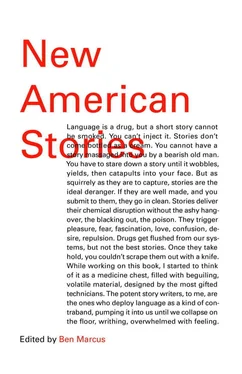“So,” Corinne had said in a loud and artificially genial tone as if she were speaking to an armed high-school student, “where did you and William meet, Otto?”
The table fell silent; Otto looked out at the wolfish ring of faces. “On Third Avenue,” he said distinctly, and returned to his meal.
—
“Sorry,” he said, as he and William climbed into the car afterward. “Sorry to have embarrassed you. Sorry to have shocked them. Sorry, sorry, sorry. But what was I supposed to say? All that completely fraudulent interest. The solicitude . The truth is, they’ve never sanctioned my way of life. Or, alternately, they’ve always sanctioned it. Oh, what on earth good is it to have a word that means only itself and its opposite!”
Driving back to the city, through the assaultively scenic and demographically uniform little towns, they were silent. William had witnessed; his power over Otto had been substantially increased by the preceding several hours, and yet he was exhibiting no signs of triumph. On the contrary, his habitual chipper mood was — where? Simply eclipsed. Otto glanced at him; no glance was returned.
Back in the apartment, they sat for a while in the dark. Tears stung Otto’s eyes and nose. He would miss William terribly. “It was a mistake,” he said.
William gestured absently. “Well, we had to do it sooner or later.”
We? We did? It was as if snow had begun to fall in the apartment — a gentle, chiming, twinkling snow. And sitting there, looking at one another silently, it became apparent that what each was facing was his future.
—
Marvelous to watch William out in the garden, now with the late chrysanthemums. It was a flower Otto had never liked until William instructed him to look again. Well, all right, so it wasn’t a merry flower. But flowers could comfortably embrace a range of qualities, it seemed. And now, how Otto loved the imperial colors, the tensely arched blossoms, the cleansing scent that seemed dipped up from the pure well of winter, nature’s ceremony of end and beginning.
The flat little disk of autumn sun was retreating, high up over the neighbors’ buildings. As Otto gazed out the window, William straightened, shaded his eyes, waved, and bent back to work. Late in the year, William in the garden…
—
Otto bought the brownstone when he and William had decided to truly move in together. Over twenty-five years ago, that was. The place was in disrepair and cost comparatively little at the time. While Otto hacked his way through the barbed thickets of intellectual property rights issues that had begun to spring up everywhere, struggling to disentangle tiny shoots of weak, drab good from vibrant, hardy evil, William worked in the garden and on the house. And to earn, as he insisted on doing, a modest living of his own, he proofread for a small company that published books about music. Eventually they rented out the top story of the brownstone, for a purely nominal sum, to Naomi, whom they’d met around the neighborhood and liked. It was nice to come home late and see her light on, to run into her on the stairs.
She’d been just a girl when she’d moved in, really, nodding and smiling and ducking her head when she encountered them at the door or on the way up with intractable brown paper bags, bulging as if they were full of cats but tufted with peculiar groceries — vegetables sprouting globular appendages and sloshing cartons of mysterious liquids. Then, farther along in the distant past, Margaret had appeared.
Where there had been one in the market, at the corner bar, on the stairs, now there were two. Naomi, short and lively, given to boots and charming cowgirl skirts; tall, arrestingly bony Margaret with arched eyebrows and bright red hair. Now there were lines around Naomi’s eyes; she had widened and settled downward. One rarely recalled Margaret’s early, sylvan loveliness.
So long ago! Though it felt that way only at moments — when Otto passed by a mirror unprepared, or when he bothered to register the probable ages (in comparison with his own) of people whom — so recently! — he would have taken for contemporaries, or when he caught a glimpse of a middle-aged person coming toward him on the street who turned into William. Or sometimes when he thought of Sharon.
And right this moment, Naomi and Margaret were on their way back from China with their baby. The adoption went through! Naomi’s recent, ecstatic e-mail had announced. Adoption. Had the girls upstairs failed to notice that they had slid into their late forties?
—
Sharon’s apartment looked, as always, as if it had been sealed up in some innocent period against approaching catastrophes. There were several blond wood chairs, and a sofa, all slipcovered in a nubby, unexceptionable fabric that suggested nuns’ sleepwear, and a plastic hassock. The simple, undemanding shapes of the furnishings portrayed the humility of daily life — or at least, Otto thought, of Sharon’s daily life. The Formica counter was blankly unstained, and in the cupboards there was a set of heavy, functional, white dishes.
It was just possible, if you craned, and scrunched yourself properly, to glimpse through the window a corner of Sharon’s beloved planetarium, where she spent many of her waking hours; the light that made its way to the window around the encircling buildings was pale and tender, an elegy from a distant sun. Sharon herself sometimes seemed to Otto like an apparition from the past. As the rest of them aged, her small frame continued to look like a young girl’s; her hair remained an infantine flaxen. To hold it back she wore bright, plastic barrettes.
A large computer, a gift from Otto, sat in the living room, its screen permanently alive. Charts of the constellations were pinned to one of the bedroom walls, and on the facing wall were topographical maps. Peeking into the room, one felt as if one were traveling with Sharon in some zone between earth and sky; yes, down there, so far away — that was our planet.
Why did he need so many things in his life, Otto wondered; why did all these things have to be so special? Special, beautiful plates; special, beautiful furniture; special, beautiful everything. And all that specialness, it occurred to him, intended only to ensure that no one — especially himself — could possibly underestimate his value. Yet it actually served to illustrate how corroded he was, how threadbare his native resources, how impoverished his discourse with everything that lived and was human.
Sharon filled a teakettle with water and lit one of the stove burners. The kettle was dented, but oddly bright, as if she’d just scrubbed it. “I’m thinking of buying a sculpture,” she said. “Nothing big. Sit down, Otto, if you’d like. With some pleasant vertical bits.”
“Good plan,” Otto said. “Where did you find it?”
“Find it?” she said. “Oh. It’s a theoretical sculpture. Abstract in that sense, at least. Because I realized you were right.”
About what? Well, it was certainly plausible that he had once idly said something about a sculpture, possibly when he’d helped her find the place and move in, decades earlier. She remembered encyclopedically her years of education, pages of print, apparently arbitrary details of their histories. And some trivial incident or phrase from their childhood might at any time fetch up from her mind and flop down in front of her, alive and thrashing.
No, but it couldn’t be called “remembering” at all, really, could it? That simply wasn’t what people meant by “remembering.” No act of mind or the psyche was needed for Sharon to reclaim anything, because nothing in her brain ever sifted down out of precedence. The passage of time failed to distance, blur, or diminish her experiences. The nacreous layers that formed around the events in one’s history to smooth, distinguish, and beautify them never materialized around Sharon’s; her history skittered here and there in its original sharp grains on a depthless plane that resembled neither calendar nor clock.
Читать дальше










![Женя Джентбаев - neo futura [stories]](/books/692472/zhenya-dzhentbaev-neo-futura-stories-thumb.webp)

